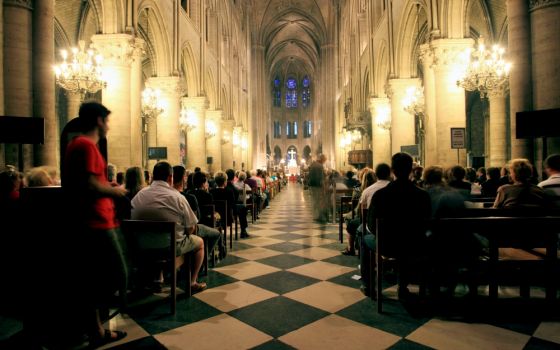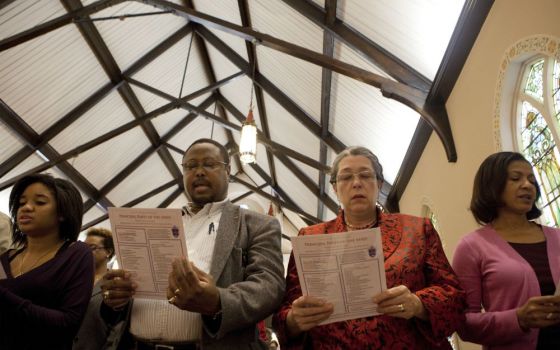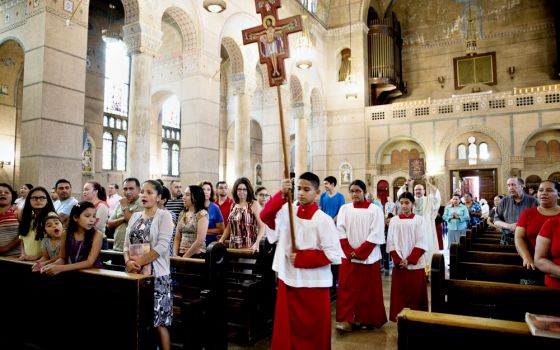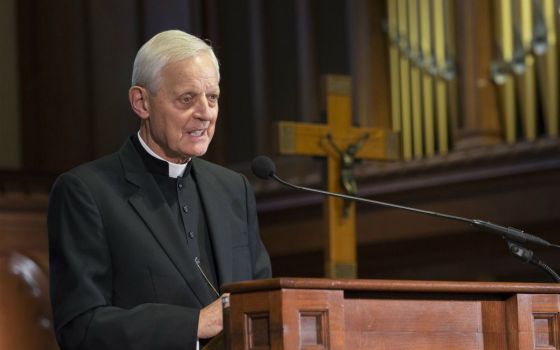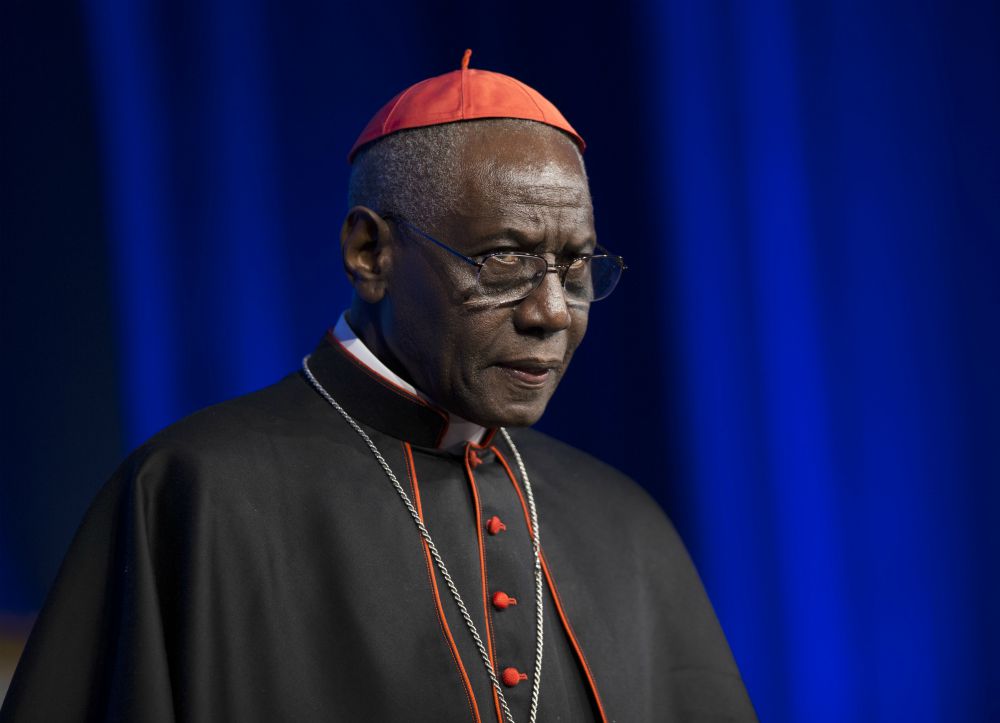
Cardinal Robert Sarah, prefect of the Congregation for Divine Worship and the Sacraments, is pictured May 17, 2016. (CNS/Bob Roller)
The remarkable letter Pope Francis wrote to Cardinal Robert Sarah, prefect of the Congregation for Divine Worship, did not pose a question to the cardinal that I should now like to ask: How would you, Cardinal Sarah, translate the phrase "Roma locuta est, causa finita est"?
Of course, if the cardinal were to follow the guidelines set forth in Liturgiam authenticam, the 2001 document that placed a priority on slavishly following the precise Latin original, he would render the words as: "Rome has spoken, the cause is finished." But, in modern English, we do not use "cause" in that manner, so if one allows that the purpose of translation is to render something that is comprehensible, we might say: "Rome has spoken, case closed."
The Holy Father's letter was unprecedented. I have searched my memory and my history books and cannot find such a public rebuke of a cardinal. (Pope Alexander VI's use of cantarella to kill of some of his cardinal enemies is the stuff of popular culture, not historical fact.) Cardinal Louis Billot got into a protracted struggle with Pope Pius XI over the latter's condemnation of Action Française, and resigned his cardinal's hat, but the initiative was apparently Billot's. Certainly, not since Vatican II have we seen such a public spanking of a high-ranking prelate.
At issue was a statement by Sarah that suggested Liturgiam authenticam remained normative, and with it the Vatican's right to impose liturgical translations on various episcopal conferences, rather than Pope Francis' recent document issued "motu proprio" ("on one's own initiative") on the subject, Magnum Principium ("The Great Principle"), which restored the central role in approving translations to the world's bishops' conferences. Sarah's commentary appeared in the French journal L'Homme Nouveau and was retranslated into other languages.
The pope, always keen on mercy, included in his letter the possibility that commentary had not been Sarah's. Some conservative commentators, such as Father Zuhlsdorf, have picked up on this part of the pope's letter to suggest that Sarah did not actually write the commentary, and that everyone should relax. Of course, two weeks ago, when the L'Homme Nouveau article first appeared, Zuhlsdorf was commending Sarah for what he had said. He cited this article at the National Catholic Register by Edward Pentin. Neither man suggested then that the words were not Sarah's. So, in that light, I think we can ask Zuhlsdorf what is the Latin for "wiggle room"? That is what Pope Francis was affording Sarah, a chance to say that he had been misquoted, or quoted out of context, or that somehow the editors at L'Homme Nouveau had gotten it wrong.
Advertisement
An even stranger take on the pope's letter is found at First Things, where Marco Tosatti thinks the "attacks" on Sarah are because the people around Francis do not want to see the cardinal elected as the next pope. Tosatti's sources are not very good, and what to make of the editors of First Things? They applaud when some obscure theologians issue a filial correction of the pope, but see dark designs when the pope issues a correction of Cardinal Sarah. Remember the game "Where's Waldo?" The editorial policy at First Things could be characterized as "Where's the magisterium?"
Liturgical translations may have been at issue in the pope's rebuke, but more is at stake. In the first place, Pope Francis is sending a message to the entire curia that he will not tolerate insubordination any longer. Members of the curia, even cardinals, work to help the pope in his apostolic ministry, not the other way 'round. Usually, the men selected have some expertise in the area of competency for the dicastery they are appointed to lead, although — and here I fault Francis — there is nothing in Sarah's biography to suggest any special competence in liturgical theology. In any event, they are there to help the pope do his job, and we have all heard stories of people in the curia trying to undermine Francis. Next March, he will have been pope for five years. It is time for everyone in the Roman curia to get on board or find another line of work. The fact that Sarah is a curial cardinal also explains why Francis was so public and direct in this rebuke while he has chosen only to quietly ignore the cardinals who posed faux-dubia about Amoris Laetitia.
Beyond the managerial issue stands the broader ecclesiological concern. Pope Francis has made synodality a key theme of his pontificate. He sees this as a return to the vision articulated, and experienced, at the Second Vatican Council. Granting bishops' conferences throughout the world a determinative role in liturgical translations is part of that vision, but it goes beyond who gets to decide about "consubstantial" and "dewfall." The concentration of decision-making in the Vatican is a recent phenomenon, a response both to the anti-religious fervor of the 19th century and to the improved means of communication available to us today. In the 13th or the 17th century, Rome might issue a decree, but it had to be translated by the local bishops, tailored to their situation, and local priests would, in turn, tailor what they received from their bishop to the circumstances of the faithful entrusted to their care. Now, your average Catholic is likely to first learn about a Vatican pronouncement in The New York Times — or, if they are sophisticated, at
Francis is no fan of sclerosis. His vision of a church engaged, accompanying people, a field hospital, getting dirty in the streets, this is the opposite of the "prisoner of the Vatican" mentality that predominated in the latter half of the 19th century and still predominates among all those sectarian Catholics who worry more about contamination than evangelization, those who unwittingly murder the tradition because they wish it to be static and unmovable — irreformable, as they like to say — when a tradition that is alive is always stretching, adapting, reaching back to its deepest sources to get past the cultural encrustations that impede healthy growth. Those cultural encrustations should never be mocked, nor should they abandoned lightly. They represent the attempts of previous generations to live their faith, and a faith that does not generate culture is a dead faith. But faith dies when we mistake those cultural antecedents for completely adequate instances of inculturation for our time and our cultures. We do not honor those who came before us by slavishly dotting our i's and crossing our t's as they did. We honor them by making sure our ancient faith, in our time, is generating culture too.
[Michael Sean Winters covers the nexus of religion and politics for NCR.]
Editor's note: Don't miss out on Michael Sean Winters' latest! Sign up to receive free newsletters, and we will notify you when he publishes new Distinctly Catholic columns.




